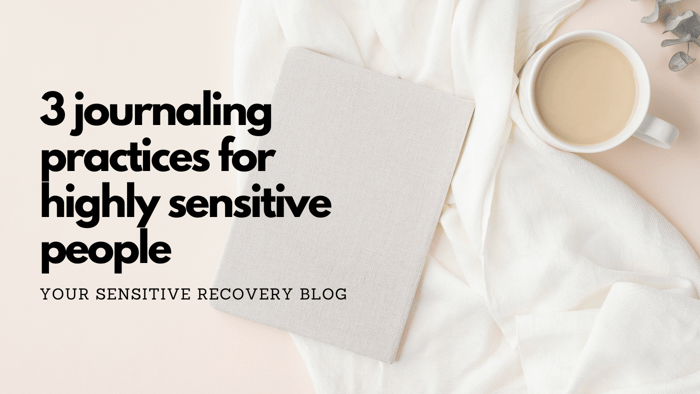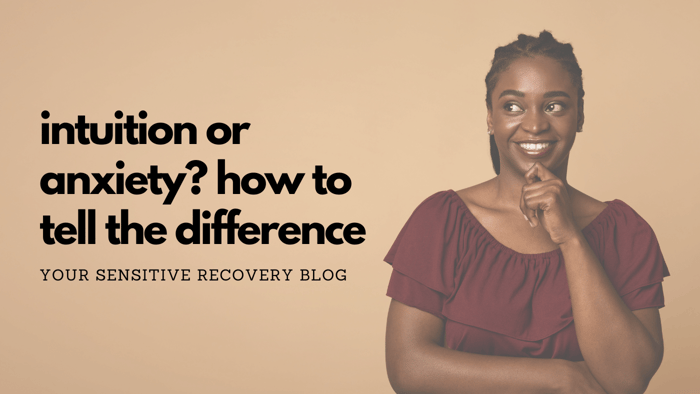It seems that the benefits of journaling are endless. Highly Sensitive People may find the practice especially rewarding. Journaling helps improve self-awareness, increases mindfulness and communication skills, and assists us in processing our emotions. (And we HSPs have plenty of those to sift through!)
I frequently suggest journaling to my Highly Sensitive clients, yet I’m often met with at least a little resistance.
I've heard clients express everything from "I'm afraid to journal because it will just make me feel things more", to, "I'm not good at journaling." I get it. Sitting with what's happening inside isn't always pleasant. But compassionate exploration will always help you move through it. Pushing it down and ignoring it never will. And in response to not feeling GOOD at journaling, let me just say that it's impossible to be bad at journaling. It just is.
I understand how difficult it can be to develop a new habit, especially if you feel a little lost as to where to begin. Below are 3 simple journaling practices that Highly Sensitive People will love. Try one per day and see what feels good to you.
1. Daily Delights
This is a fun one. It's pretty difficult to feel down on yourself when you're focusing on thankfulness. "Gratitude begets gratitude." This essentially means that the more you practice gratitude, the more gracious you become, and the quicker you are to notice the good in your day-to-day life.
Daily Delights are a great way to zoom in and appreciate the small stuff. Highly Sensitive People notice everything, so capitalize on this!
Each night, commit to writing down 3 or more things from the day that brought you even a momentary glimpse of delight. For example: The smell of your coffee this morning, the uplifting voicemail from a friend, and the ladybug you noticed on your car. 🐞
2. Feeling Wheel
Never heard of a Feeling Wheel? Give it a quick Google! Using one can help you get up close and personal with what's going on inside. Because of how deeply we process emotions, HSPs can sometimes have trouble identifying and naming what’s happening inside. Browsing a Feeling Wheel or even just a list of emotion words can help you identify emotions that you might not have otherwise noticed or known how to name.
Some people like to start in the middle of the wheel and work their way out toward the more specific feelings. Some prefer the other way around. The goal is to pick 1-3 emotions that you feel strongly connected to in the moment and explore them. You might write about how you know you are feeling that way; where you feel the emotion in your body if you do, or if specific thoughts are prompting the emotion. With practice, this tool can help you acknowledge and sit through emotions, even the difficult ones, with a bit more ease.
3. Morning Pages
(As described in The Artist's Way.) This stream-of-consciousness technique is all about clearing your mind of unnecessary clutter. It is suggested that you write first thing in the morning for at least 3 pages worth. That might feel like a lot. If you prefer, set a timer for 10 minutes instead. Don't worry if what you're writing feels like it has nothing to do with anything. You're letting your pen or pencil move freely and quickly with your mind. You might be amazed at some of the thoughts that pour out!
"If I don't write to empty my mind, I go mad." - Lord Byron
Whichever way you decide to start your journaling habit, make sure to go easy on yourself, my sensitive friend. Journaling is for you only. No need to impress!
Resist the temptation to edit your writing or to check your spelling. Also, avoid the keyboard if possible. Handwriting activates your left hemisphere, home of logic and rationale, leaving your right brain free to feel your feelings - and feeling, after all, is healing.
💕
✨ Josie Munroe, LMFT is a licensed therapist and owner of JosieMunroe.com and Your Sensitive Recovery As a recovered clinician and Highly Sensitive Person, she loves supporting others on their journeys to form new, empowered relationships with food, their bodies, and their sensitivity. Join the newsletter for a weekly boost of hope and inspiration. You deserve a recovery that works for you! ✨





